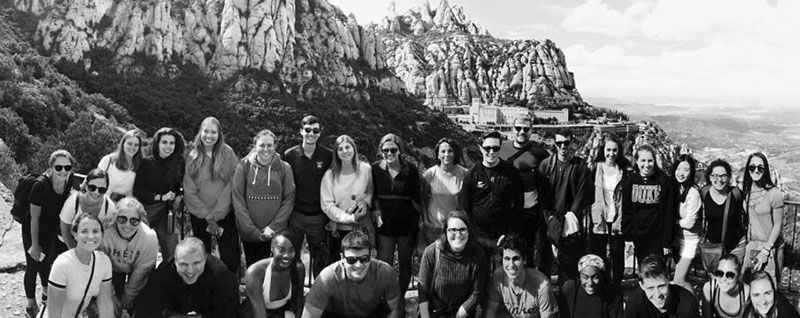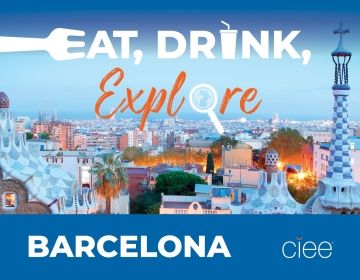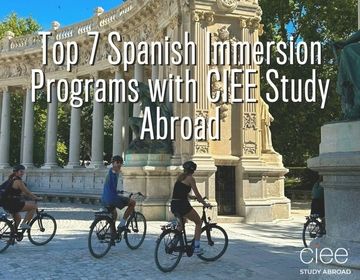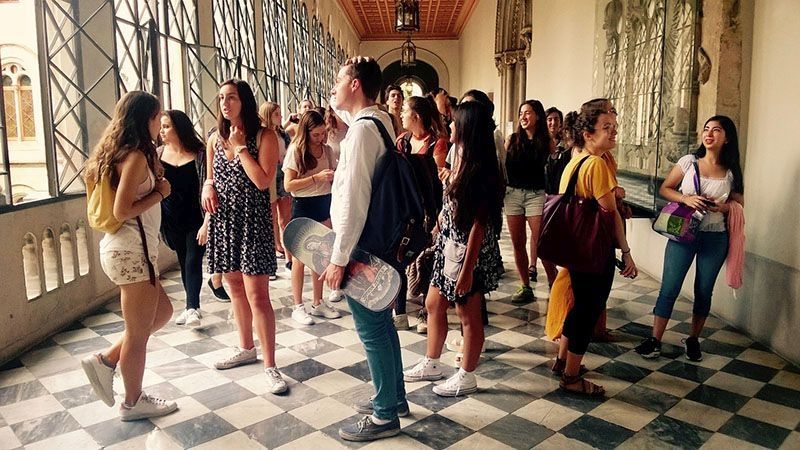Advanced Liberal Arts, Fall 2017, Newsletter I
Fall term
Mercury is falling. Autumn finally stirs awake, and this week, the sticky humidity of summer in the city paves a path for a mild, fresh, and very welcome autumn breeze that wafts us all out of our houses and onto the streets of Barcelona. The students from the Advanced Liberal Arts Program are saying farewell to these last days of the beach and are already making their way each morning from their new homes to the different departments of the Universidad de Barcelona and the CIEE Study Center. They are attending classes that represent all areas of knowledge, and which will contribute, more than anything else, to their personal growth that which only the academic experience can attribute to young university students. “Artificial Vision”, “Cellular Biology”, “Comparative Political Systems”, “Psychopathology”, “Game Theory for Business”, “Aesthetics and Ideology of the Spanish Romanticism”, “The History of Economic Though”, “Latin American Literature until Modernism”, “Gender and History”, “Neuropsychology”, “International Economic Organization”, “Literature & Cinema in Spain”, “Philosophy of Law”, and “Phonetics and Phonology of Spanish” are only a few examples of the courses that our students will be taking in the CIEE ALA Program during this fall term.

(ALA students visiting the mountain and the Benedictine abbey of Montserrat)
(Students in the University of Barcelona Old Main)
Orientation, rules of navigation, and doors to open
For any person, the first days in a new city are always special. When our students arrived in Barcelona, only a few days ago, the city was both a familiar and unfamiliar place at the same time: Familiar because they had previously researched the city, looking for literary, artistic, and cinematographic references, or because they simply had conversations with other students from their universities that had been to Barcelona before and who shared their personal experiences, inundating them with incessant advice and recommendations that, shortly after arriving, the current students began to realize were impossible to follow or reproduce. But as mentioned before, it was also an unfamiliar space because none of those conversations, nor the different screens they viewed in search of images and information before traveling, nor even the simple black and white of the page of a book could compare to the multisensory experience that invades us when we walk through the streets for the first time.
During the first week of their stay, CIEE organized a series of orientation sessions focused on facilitating this marvelous experience of being “new” in a new place: Advice on how to get around the city, how to find this place or that, detailed information about their classes would be, the Spanish education system, health & security, house rules for residences, homestays, and shared apartments… What to visit, what to try, what to see, what to taste… Different rules of navigation, new coordinates and lines to follow – all with the goal of converting that which was unfamiliar to familiar.
The saturation of information during orientation is inevitable. We know that… but in the end, what CIEE gives during these first days is a key that opens a door yet to be discovered. Or better yet, a key capable of opening a million and one doors, all of them different. And it will be these students who, during the rest of the term and from their personal and unique experiences, will go opening and closing doors until they find the right combination that unlocks “their” Barcelona.
Related Posts

EAT, DRINK, EXPLORE: BARCELONA
BEST FOOD TO EAT IN BARCELONA A study abroad trip to Barcelona isn’t complete without tasting Spain’s famous paella. Paella originates from the Valencian region but is internationally recognized as... keep reading

Top 7 Spanish Immersion Programs with CIEE Study Abroad
Let’s be real: There’s no better way to learn Spanish than actually living it. Forget the textbook exercises and Duolingo streaks – envision yourself chatting with locals about fútbol (not... keep reading

How to Study Abroad in Europe: 3 Steps
Europe is the top dog for study abroad students. The latest indication: nearly two-thirds of all U.S. students studying abroad did so in Europe, as reported by the Institute of... keep reading
